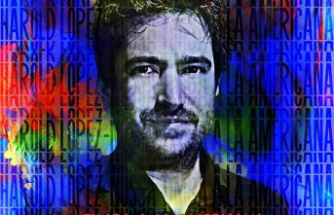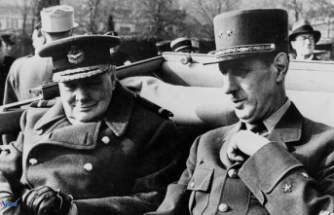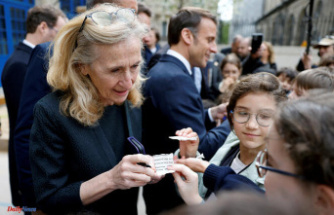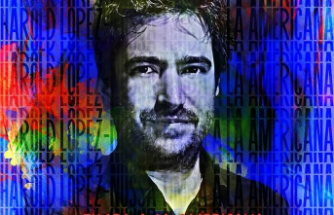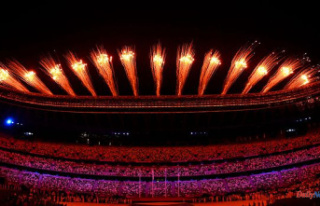One fine day we will see a cloud of smoke..." Madame Butterfly, the 15-year-old geisha Cio-Cio San, who was married to a horny American naval captain, has just performed her great aria "Un bel di vedremo" on the Bregenz lake stage, bewitchingly beautiful and sung fragile, in which she waits for the ship of her faithless lover, who should at least love her like a child.
Their son was just able to put a paper boat in the waves of Lake Constance, then suddenly the lights go on. This year's Puccini premiere will be canceled after an hour - almost halfway through.
Instead of the cloud of smoke, we see a thunderstorm front rushing towards us from Lindau, with yellow lightning flashing through it. It had already rained down beforehand, and during the performance it began to get wet again - appropriately enough, when Uncle Bonzo (Stanislav Vorobyov) loudly cursed the intercontinental misalliance, so that the rustling of the rain capes unfolding seven thousandfold could hardly be heard.
But now the Bregenz Plan B can be experienced for the first time for the premiere guests. It was only in 1997 that Götz Friedrich's "Porgy and Bess" premiere, spectacularly placed on a ruined motorway bridge, had to be played completely in the indoor version due to persistently bad weather. However, there has never been a break in a new production in Bregenz.
In contrast to the current situation at airports and train stations, the move to the Festspielhaus, which is located under the grandstand, is taking place without chaos and perfectly organized - although there is only room for 1660 people in the house, more than two thirds of the expectant visitors are being sent home, but because of the onset rain in the foyers. The forms for the accommodatingly granted return transfer of the entrance fees, which is actually only due halfway through, appear on the mobile phones - and 25 minutes after the cancellation, the prelude to the remaining "Butterfly" sounds in the hall.
It's actually not a seascape at all. Apart from the arrival of the relatives - as an exotic fabric and umbrella orgy in red and mud green - there is nothing visually spectacular in this chamber play. But because the title is super popular and Puccini's bittersweet melodies develop XXL intensity, the artistic director Elisabeth Sobotka, who will soon be moving to the Berlin State Opera, dared to offer this actually intimate work as a popular entertainment.
Which, of course, didn't happen at all. Director Andreas Homoki and above all his stage designer Michael Levine have reduced the open-air spectacle on the lake, which has become somewhat hollow in recent years and boasts ever new gimmicks, back to its origins.
While in the Arena di Verona, in the Theater of Orange or in the Herodes Atticus Odeon in Athens, the focus is always on ancient architecture, on the empty lake stage between the water and the Pfänder mountain you can always start from scratch, with the iconic object being the center of the picture . This year it's just a windblown, crumpled sheet of tissue paper with calligraphy of trees and mountains - nevertheless 1340 square meters in area, 33 meters wide, 23 meters high and weighing 300 tons.
To enliven this, dancing spirit ancestors are used to accompany the butterfly; the colors on the sheet change according to the state of mind of the protagonist. Captain Pinkerton (for reasons of length, the somewhat flabby Edgaras Montvidas was deprived of his aria) pushes his way through the sheet in two places. The Stars and Stripes are also planted aggressively in an imperialistic manner, although the calm before the thunderstorm lets it stick to the mast.
Two of the three machine tricks that are now no longer shown could already be seen during the stage tour: the child's paper boat brings the father back in the eleven by six meter version, bride suitor Yamadori is driven through the lake by servants on a platform . And the TV news the night before revealed that the paper stage was on video flames at Butterfly's suicide and a sheaf of fire was deflagrating at the back.
Of course, seeing the original outside would not have changed anything about the cross-conventional, mass-produced homoki view of this racist tragedy. In the house, on a small playing surface, it becomes a touching chamber piece, because Barno Ismatullaeva and her Suzuki Annalisa Stroppa sing so enchantingly beautiful and intensely. The Wiener Symphoniker, placed behind them in front of various slides of the stage design, play tenderly dense under the confidently generous Enrique Mazzola; Outside it sounded a bit bass-heavy at first.
The director refused to bow, and he also said nothing about the growing conflict about cultural appropriation in this opera. Up close you can see: The Uzbek in the title role is not wearing Asian make-up. And the enthusiastic Bregenzer continues to drink his Mohrenbräu.


